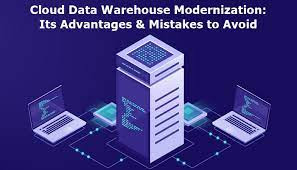In the age of big data, where information reigns supreme, organizations are stockpiling data at an unprecedented rate. However, simply collecting data isn't enough. To unlock its true potential and gain valuable insights, businesses need a robust data warehouse – and in today's landscape, a modernized one. Here's why data warehouse modernization is no longer optional, but a strategic imperative.
The Limitations of Traditional Warehouses: A Roadblock to Big Data Success
Traditional data warehouses, designed for structured and historical data, struggle with the complexities of big data. These limitations create a bottleneck, hindering your ability to leverage the power of big data:
- Limited Scalability: Traditional warehouses buckle under the sheer volume and velocity of big data, leading to performance issues and hampering real-time insights.
- Data Variety Bottleneck: Structured data warehouses can't handle the diverse formats (structured, semi-structured, unstructured) inherent in big data, creating isolated data pockets.
- ETL Bottleneck: The Extract, Transform, Load (ETL) process, crucial for preparing data for the warehouse, becomes slow and cumbersome with massive big data sets.
These limitations create a chasm between the raw power of big data and its actionable insights. Data warehouse modernization bridges this gap.
Modernization: Breathing New Life into Your Data Warehouse
Data warehouse modernization is the strategic revamp of a data warehouse to handle the demands of a big data environment. This process involves embracing new technologies and approaches:
- Cloud-Based Infrastructure: Migrating to the cloud offers scalability and agility. Your data warehouse can seamlessly grow alongside your big data, ensuring smooth performance.
- Big Data Integration Tools: These tools streamline the ETL process, efficiently ingesting and transforming diverse big data formats into the warehouse.
- In-Memory Computing: This technology supercharges data processing and analysis, enabling faster access to real-time insights derived from big data.
- Data Lake Integration: Modern data warehouses can connect with data lakes, repositories for raw, unprocessed big data. This allows for a holistic view of both historical and real-time information.
The Advantages of a Modernized Data Warehouse: A Big Data Powerhouse
A modernized data warehouse unlocks the true potential of your big data strategy, empowering organizations with:
- Enhanced Scalability and Agility: The cloud-based infrastructure allows the data warehouse to scale effortlessly with growing big data volumes, ensuring smooth performance.
- Unified Data Landscape: By handling both structured and diverse big data formats, the modernized warehouse breaks down data silos, providing a comprehensive view of all information.
- Faster Insights and Decision-Making: Improved data processing speeds and real-time data integration enable quicker access to valuable insights, allowing for data-driven decision-making in a timely manner.
- Improved Data Governance: Modernized data warehouses offer robust data governance features, ensuring data quality and consistency throughout the big data ecosystem.
- Reduced Costs: Modernization can lead to cost savings through optimized infrastructure utilization and streamlined data management processes.
Conclusion
In today's data-driven world, big data offers a treasure trove of insights waiting to be unearthed. However, without a modernized data warehouse, this treasure remains buried. By embracing data warehouse modernization, organizations can transform their data into a strategic asset, enabling them to make informed decisions, optimize operations, and gain a competitive edge in the ever-evolving big data landscape.








